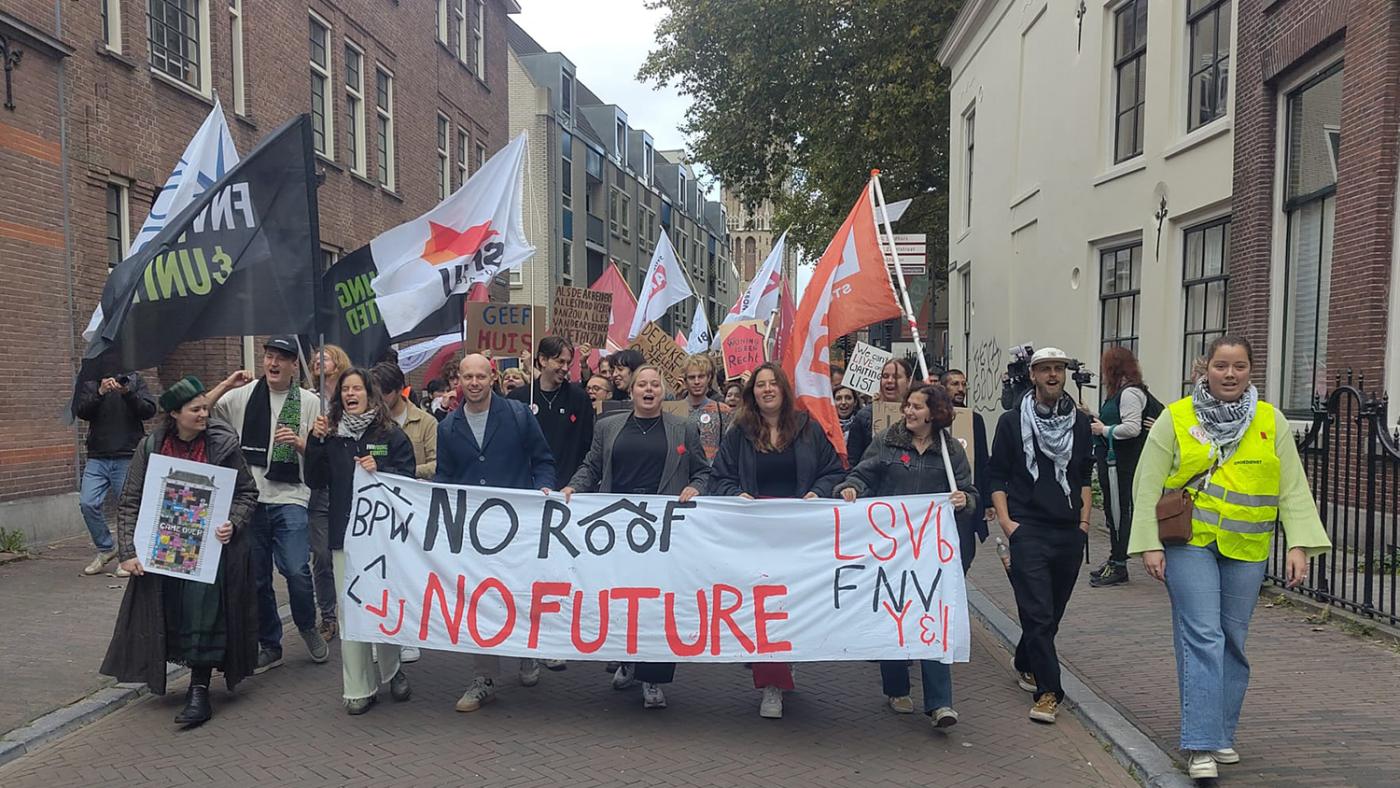Hardly any students participate in protest against housing crisis: ‘No roof, no future’
‘Campus contract has become a route to homelessness’

Friday, October 17, around noon. Approximately eighty people are gathered at Dom Square in Utrecht. The student organisations LSVb, Vidius, Precarious Housing Association (Bond Precaire Woonvormen inDutch) and FNV Young & United are organising a protest here today, alongside the Housing Association, to oppose the housing shortage, the room shortage, and the excessive rents being charged as a result. Dozens of other groups from all around the country have also associated themselves with the protest.
According to co-organiser Maaike Krom (26), chair of the National Student Union (LSVb), it is important to form a united front against the current situation in the Dutch housing market before the parliamentary elections take place. They are scheduled for October 29. 'We don't want to wait until a new cabinet is in place, because it could take a long time for them to form a coalition. If we wait, everything will be at a standstill for another two to four years. The current cabinet must make decisions now and implement them immediately, given that we are in the midst of a crisis that will turn into a disaster if we do nothing about it.'
Housing shortage on the rise
At around 1:45 pm, the first speaker takes the floor to explain why it is essential to address this issue on a Friday afternoon. The figures paint the picture of a complicated housing market in which young people and students are losing out. Buying a home has become out of reach for many young people, which is partly due to a shortage of homes and the rising prices of homes for sale.
Alternatives such as social housing or renting from private landlords no longer offer a solution to young people. The demand for social housing is many times greater than the available supply and rents have risen sharply in the commercial rental sector. As a result, there is a significant shortage of affordable housing. Last but not least, the Netherlands is 21,500 student rooms short of meeting the demand, and the shortage is predicted to rise to 63,200 rooms by 2032-2033.

Campus contract
For Doenja van der Veen (25), these are not just statistics but a reality she faces every day, because of her living situation but also due to her affiliation with the Precarious Housing Association (Dutch acronym: BPW). She graduated with a Master's degree in Law & Sociology from Leiden University a few years ago, but still lives with a group of people in a shared social housing apartment in Utrecht. She pays around 500 euros for an 18-square-metre room.
‘My situation isn't too bad because I do have a roof over my head, but I would like to have my own place. I just don't know how to find one. I think I will have to continue living in this apartment for quite a while; I have nowhere else to go. Friends often stay with us for long periods of time because they can't find a place, either. The place gets really cramped when that happens.’
During her conversation with DUB, Doenja suggests a few ways to improve the situation. ‘We should abolish the ban on squatting, eliminate temporary rental contracts, apply a vacancy regulation, and tackle speculation in the real estate market. These measures would go a long way.’
Doenja no longer believes in the current campus contract structure. This type of contract was introduced in 2006 to speed up the turnover at student housing, giving more students the opportunity to find an affordable place to live during their studies. However, tenants with such contracts must leave the property within a certain period of time after completing their studies. ‘It's a fairly new invention, but it leaves young people in uncertainty. It has become a route to homelessness. In the past, young graduates could find a place to live after their contracts expired, but doing so has become very difficult now.’
Where are the students?
Teun Otte (22) is a History student at VU Amsterdam and also a candidate in the parliamentary elections, as a member of the left-wing party BIJ1. In that capacity, housing is one of their main focus areas. 'I live in a student housing building in Amsterdam-West where the elevators never work and there's mice everywhere. The space is okay, but the quality of the room is absolutely awful. I pay 450 euros for 11.5 square metres. We don't earn that much, but if you want to rent a place in Amsterdam, you're screwed.'
Teun also has several suggestions on how to improve the situation. 'There are a lot of vacant properties in the cities, so something involving expropriation sounds like a good plan to me. In addition, we should build more social and affordable housing, expand rent benefits, raise the minimum wage so that young people can afford the rising prices, and abolish the youth minimum wage (In the Netherlands, the minimum wage for people aged 18 through 20 is but a percentage of the general minimum wage. The youth wage increases from 50 percent to 60 percent to 80 percent of the minimum wage with each passing year, Ed.).'
The protest proceeds peacefully, and the audience responds well to the speakers' enthusiasm. However, one cannot help but wonder why there seem to be more journalists around than protesters. Most of the people present are either involved with the protest's organisation or members of affiliated organisations. Only a few students have come.
What the hell
Dante Glastra van Loon (22), Chair of the Utrecht Student Union, Vidius, had hoped for a better turnout. According to him, this is certainly not due to a lack of interest in the subject. ‘When I talk to students, they tell me that finding a suitable home is their main problem.’
Despite the low turnout, the protest is lively. They sing loudly and chant familiar slogans as they walk through the streets of Utrecht. Many passersby stop to figure out what these people are demonstrating against. When asked this question, the protesters shout at the top of their voices: Wat de fak, ik wil gewoon een dak! ("What the hell, I just want a roof over my head!").
CBS had ook nog een interessante doorrekening wat betreft leegstand:
"Al die leegstand bij elkaar, is evenveel oppervlak als 200.000 standaard nieuwbouwappartementen."
"In totaal staat er 17,8 miljoen vierkante meter aan panden structureel leeg, meldt het CBS. Er zit al zeker een jaar geen bewoner of huurder in. Ook wordt er geen of nauwelijks energie afgenomen in deze gebouwen."
bron: https://www.rtl.nl/nieuws/binnenland/artikel/5534261/genoeg-leegstand-n…